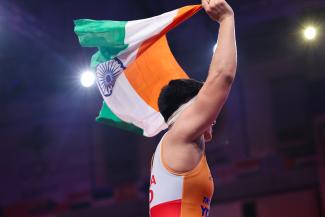Kus and Sasunouski to Square off Saturday Night in Top-Four Matchup
Friday, July 26, 2019 - 16:00 By Eric Olanowski

MINSK, Belarus (July 26) --- Top-ranked Emrah KUS (TUR) capped off the opening day of wrestling at the Oleg Karavaev with a trio of wins and will square off with fourth-ranked Viktar SASUNOUSKI (BLR) in the 82kg finals.
Kus kick-started his day with a 6-2 win over Marad HUSEINAU (BLR), then followed that up with an 8-0 routing of Jalgasbay BERDIMURATOV (UZB) to set up a semifinals match with Bilan NALGIEV (UZB). The Uzbek had a 1-0 lead over the reigning world runner-up but an inactivity point and a front head pinch earned Kus the 3-1 victory.
He’ll meet Belarus’ fourth-ranked Viktar Sasunouski for the gold medal. The Belarusian trailed 3-1 late into the second period but slipped his way into a side head lock -- picking up four points and the 5-3 lead. He later tacked on two additional points for a correct throw and won, 7-3.
Meanwhile, Shinobu OTA (JPN) fell behind 8-3 in his 63kg semifinal bout against Mirambek AINAGULOV (KAZ) but scored six unanswered points and locked up his spot in the Oleg Karavaev finals with the 9-8 come-from-behind victory.
Ota, the Rio Olympic runner-up, will see Islomjon BAKHRAMOV (UZB) in the gold-medal bout.
Bakhramov, the 15th-ranked wrestler in the world down at 55kg, bumped up to 60kg and knocked off reigning world bronze medalist WALIHAN Sailike (CHN), 3-3 after trailing by three points heading into the closing three minutes.
RESULTS
63kg
GOLD - Islomjon BAKHRAMOV (UZB) vs. Shinobu OTA (JPN)
SEMIFINAL - Islomjon BAKHRAMOV (UZB) df. Sailike WALIHAN (CHN), 3-3
SEMIFINAL - Shinobu OTA (JPN) df. Mirambek AINAGULOV (KAZ), 9-8
72kg
GOLD - Magomed YARBILOV (RUS) vs. Narek OGANIAN (RUS)
SEMIFINAL - Narek OGANIAN (RUS) df. Meiirzhan SHERMAKHANBET (KAZ), 5-2
SEMIFINAL - Magomed YARBILOV (RUS) df. Uladzislau MANKEVICH (BLR), 8-0
82g
GOLD - Emrah KUS (TUR) vs. Viktar SASUNOUSKI (BLR)
SEMIFINAL - Emrah KUS (TUR) df. Bilan NALGIEV (UZB), 3-1
SEMIFINAL - Viktar SASUNOUSKI (BLR) df. Milad ALIRZAEV (RUS), 7-3
97kg
GOLD - Siarhei STARADUB (BLR) vs. Suleyman DEMIRCI (TUR)
SEMIFINAL - Siarhei STARADUB (BLR) df. Yerulan ISKAKOV (KAZ), 4-0
SEMIFINAL - Suleyman DEMIRCI (TUR) df. Fatih BASKOY (TUR), 2-1


Share your thoughts.
Comments